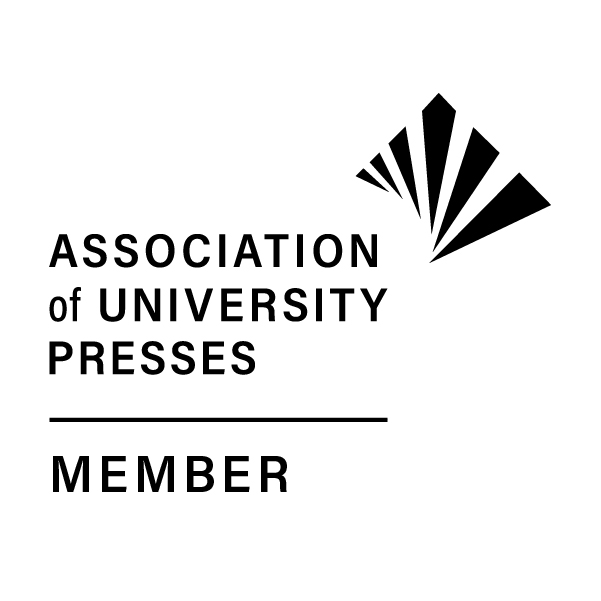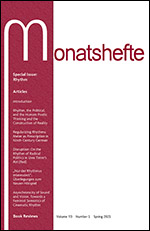|


|

Subscribe
Read the Journal Online
Submission Guidelines
Editorial Board
Receive Email Updates
Advertise in Monatshefte
Indexes/Abstracts
Current Issue TOC
Back Issues TOC
Monatshefte 2022 Subscription Rates
Institutions:
print & online $271
online only $233
Individuals:
print & online $103
online only $86
Non U.S. Postage (no postage charges for online-only subscriptions)
Airmail: add $40/yr.
Canadian Subscribers: add 5% GST. |
Monatshefte
Volume 107, Number 2, Summer 2015 Table of Contents
Articles
Rainer Würgau
Der Kristallograph in Gottfried Kellers Sinngedicht. Christian Heusser als ein Modell für den Naturforscher Reinhart
Abstract:
Recently published letters by the Swiss crystallographer and explorer Christian Heusser (1826–1909) reveal that his friend Gottfried Keller used him as a model for Reinhart, the main male character in Das Sinngedicht. The beginning of Keller’s work on the novella cycle, 1851 in Berlin, coincided with the beginning of Heusser’s post-doctoral research. A close reading of the first chapter of Das Sinngedicht provides evidence for Keller’s familiarity with Heusser’s laboratory, the general objective of his study, and the eye problems he temporarily suffered. It is argued that Keller’s portrayal of Reinhart is not, as commonly held, a scathing view of the scientific mind mitigated by humor, but rather an appreciative portrait enlivened by friendly irony. The article traces the progressive deterioration of Reinhart’s image in literary criticism since the 1960s and attributes it to the widening cultural gap between sciences and humanities. It is suggested that the merry war between Reinhart and Lucie is inspired by a concetto: Reinhart, eager to elucidate the secrets of crystal structures, tries his skill on Lucie, nicknamed Lux, who turns the tables and elucidates his character by inciting him to narrations. In the end he is found flawless, rein and hart. (RW; in German).
Johannes Schade
“Gestaute Bedeutung”: Robert Musil and the Aesthetic Order of Sense
Abstract:
This paper examines the nature of aesthetic experience in the garden chapters of Robert Musil’s Man without Qualities. Focusing on the perception of images in the text, I discuss how Musil’s rhetoric subverts the conventional understanding of perception as mimesis by emphasizing the materiality of the image, as well as the stability of the subject-object relationship. In the aesthetic “order of sense” (Cassirer), the material grounding of sensuality is shown to transcend the laws of the empirical world. Secondly, I analyze the relationship between desire and aesthetic experience. I argue that the latter is characterized by the production of desire aimed at an appropriation and full comprehension of the aesthetic object. Based on the inherent paradoxes grounded in the perception of images, this desire remains unfulfilled, thereby yielding what Musil calls an “experience of pent-up meaning.” (JS)
Naomi Beeman
Moosbrugger Speaks: Nietzschean Truth and Lying in Musil’s Der Mann ohne Eigenschaften
Abstract:
The paper articulates an implicit theory of language in Musil’s unfinished novel Der Mann ohne Eigenschaften. Specifically, I argue that Musil inverts Nietzsche’s theory of language from “On Truth and Lying in a Non-Moral Sense,” and demonstrates the results of this inversion through the characters Moosbrugger and Ulrich. Where Nietzsche valorizes the poet’s relationship to language above the philosopher-scientist’s, Musil dismisses this distinction as merely rhetorical. Nietzsche’s poet-vs.-philosopher opposition simply allegorizes what is, instead, a dynamic intermingling of ‘truth’ and ‘misrepresentation’ that lies at the metaphorical heart of language, independent of its particular uses. Moosbrugger defends himself against imprecision in speech by adopting a hyper-literal stance—a defensive posture that only magnifies the poetry of language that overwhelms him. Ulrich’s opposing sensitivity to the scientific ordering of language is equally pathological. Ulrich pawns off language’s metaphoricity on reality, concluding that we should not take God’s creation “literally.” This paper shows how Musil reads Nietzsche’s theory of the original metaphoricity of language through the Judeo-Christian myth of the active word in order to reveal Moosbrugger’s muteness as the reverse side of Ulrich’s pathological facility with language. Both, in turn, are ciphers for meta-textual questions about the conditions of Musil’s own writerly production. (NB)
Angelos Koutsourakis
Utilizing the ‘Ideological Antiquity’: Rethinking Brecht and Film Theory
Abstract:
Bertolt Brecht’s writings have been influential in film theory and cinema. Yet Brecht’s enthusiastic reception on the part of 1970s film theory has been followed by skepticism and criticism on the part of contemporary cognitivist film theory. For many years film scholars understood the adjective “Brechtian” to characterize a set of stylistic devices which are radical in themselves yet not a method. One of the reasons for this has to do with the fact that film scholarship relied on Brecht’s writings on theatre (which have so far only been available in unsatisfactory selection in translation) and not on his film essays. Marc Silberman’s brilliant translation, published as Bertolt Brecht: on Film and Radio (London: Methuen, 2001) has not changed Brecht’s critical reception in the discipline of film studies, because film scholars tend to associate Brecht with his reception within 1970s film theory. This article goes back to Brecht’s writings on the film medium so as to trace the misunderstandings of his reception in the field of film studies. I suggest that Brechtian film theory and cinema remains an “unfinished project.” (AK)
Gary L Baker
Violence and Intransitive Writing in Uwe Timm’s Der Freund und der Fremde
Abstract:
This essay examines the connection between the eulogizing elements of Der Freund und der Fremde and the author’s response to the violent and tragically early death of his friend Benno Ohnesorg. With interpretations of violence as inherently transitive and autobiographical writing as potentially intransitive, I examine the place of the violent act that killed Ohnesorg in a writing process that, though ostensibly about a third person, must become distinctly autobiographical before it can proceed. Timm’s unusual autobiographical approach to Ohnesorg’s biography is the direct consequence of the dichotomous views of Ohnesorg as student protestor and victim. By disarticulating Ohnesorg from his student movement iconography Timm interprets his friend’s death as an absurd event, in Camus’s sense of the term, while focusing on Ohnesorg’s existence as an aesthetic one. Moreover, the essay demonstrates that Timm makes an astonishing discovery in as far as his friend adhered to an approach to writing that they both at one time held in common. The absence of evidence of Ohnesorg’s writing indicates that he practiced “intransitive writing” in the truest sense of Roland Barthes’s notion of this concept. (GLB)
Review Article
Ulrich van der Heyden
Geschichtswissenschaft und Historiker in der DDR in (Selbst)-Zeugnissen
(Weißbecker, Manfred, Hrsg., Hoffnungen - Enttäuschungen - Neue Erfahrungen. Deutsche Hochschullandschaf in der „Wende“. Das Beispiel Friedrich-Schiller-Universität, 2008.—Schäfer, Peter, „Schreiben Sie das auf, Herr Schäfer!“ Erinnerungen eines Historikers an seine Universitäten in Berlin und Jena, 2007.—Jahnke, Karl Heinz, Gegen das Vergessen! Biographische Notizen. Forschungen zum Widerstand gegen die NS-Diktatur in Deutschland, 2008.— Pätzold, Kurt, Die Geschichte kennt kein Pardon. Erinnerungen eines deutschen Historikers, 2008.—Pätzold, Kurt, Streitfall Geschichte, 2011.—Peters, Jan, Menschen und Möglichkeiten. Ein Historikerleben in der DDR und anderen Traumländern, 2011.—Müller-Mertens, Eckhard, Existenz zwischen den Fronten. Analytische Memoiren oder Report zur Weltanschauung und geistig-politischen Einstellung, 2011.—Geißler, Anke, Für eine Neuorientierung der DDR und ihrer Geschichtswissenschaft. Jürgen Kuczynski und die Kontroverse um sein Buch „Der Ausbruch des Ersten Weltkrieges und die deutsche Sozialdemokratie. Chronik und Analyse“ Mitte der 1950er Jahre (=Hefte zur DDR-Geschichte, Bd. 124), 2011.—Röhr, Werner, Abwicklung. Das Ende der Geschichtswissenschaft der DDR. Band 1: Analyse einer Zerstörung, 2011; Bd. 2: Analyse ausgewählter Forschungen. Übersicht - Register, 2012.—Grebing, Helga, Freiheit, die ich meinte. Erinnerungen an Berlin, 2012.)
Book Reviews
Berwald, Olaf, ed., A Companion to the Works of Max Frisch (Richard R. Ruppel)
Bowden, Sarah, Bridal-Quest Epics in Medieval Germany: A Revisionary Approach (Ann Marie Rasmussen)
Breuer, Ingo, Katarzyna Jastal und Pawel Zarychta, Hrsg., Gesprächsspiele & Ideenmagazin. Heinrich von Kleist und die Briefkultur um 1800 (Roman Lach)
Brogi, Susanna, Carolin Freier, Ulf Freier-Otten und Katja Hartosch, Hrsg., Repräsentationen von Arbeit. Transdisziplinäre Analysen und künstlerische Produktionen (Joel Kaipainen)
Elsaghe, Yahya, Max Frisch und das zweite Gebot. Relektüren von Andorra und Homo faber (Régine Battiston)
Frederick, Samuel, Narratives Unsettled: Digression in Robert Walser, Thomas Bernhard, and Adalbert Stifter (Tove Holmes)
Frühauf, Tina and Lily E. Hirsch, eds., Dislocated Memories: Jews, Music, and Postwar German Culture (Alan Lareau)
Gemünden, Gerd, Continental Strangers: German Exile Cinema, 1933–1951 (Felix Tweraser)
Göttsche, Dirk, Remembering Africa: The Rediscovery of Colonialism in Contemporary German Literature (Antje Krüger)
Hofmann, Michael und Rita Morrien, Hrsg., Deutsch-afrikanische Diskurse in Geschichte und Gegenwart. Literatur- und kulturwissenschaftliche Perspektiven (Antje Krüger)
Horton, David, Thomas Mann in English: A Study in Literary Translation (Esther Bauer)
Lartillot, Françoise, Aurélie Le Née und Alfred Pfabigan, Hrsg., „Einzelteilchen aller Menschengehirne“. Subjekt und Subjektivität in Friederike Mayröckers (Spät-)Werk (Edith Anna Kunz)
Limpinsel, Mirco, Angemessenheit und Unangemessenheit. Studien zu einem hermeneutischen Topos (Sabine Gross)
Nickel, Jutta, Hrsg., Geld und Ökonomie im Vormärz (Jeffrey L. Sammons)
Schöning, Matthias, Hrsg., Ernst Jünger-Handbuch. Leben - Werk - Wirkung (Marcus Bullock)
Uysal Ünalan, Saniye, Interkulturelle Begegnungsräume. Neue Identitätskonstruktionen in der türkisch-deutschen Gegenwartsliteratur (Berna Gueneli)
Willand, Marcus, Lesermodelle und Lesertheorien. Historische und systematische Perspektiven (Christian Jany)
|


